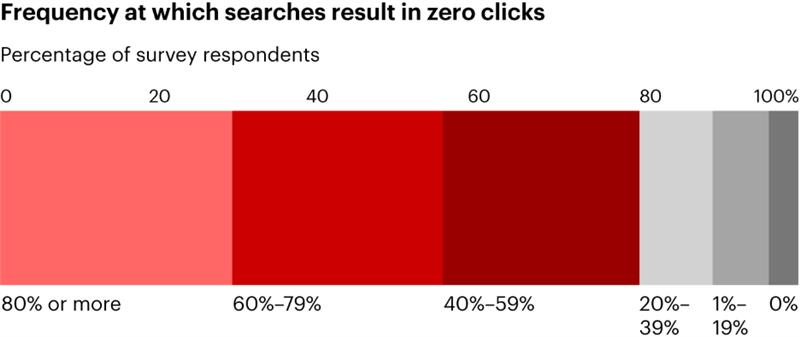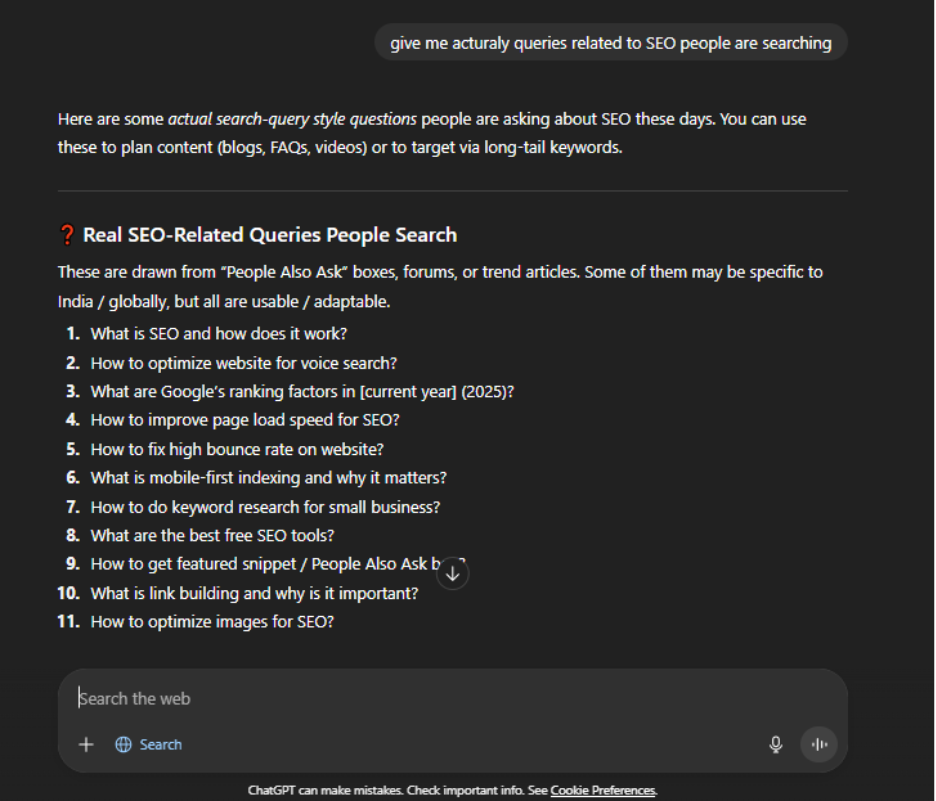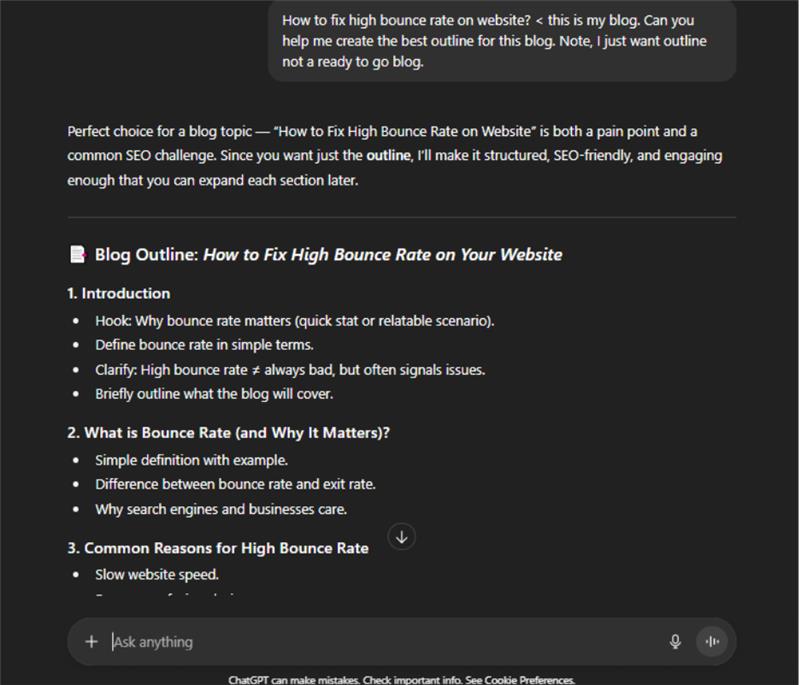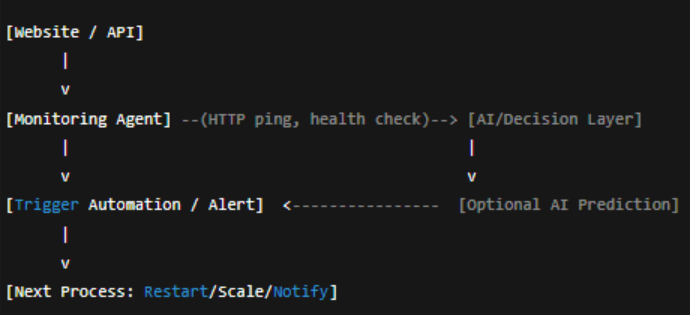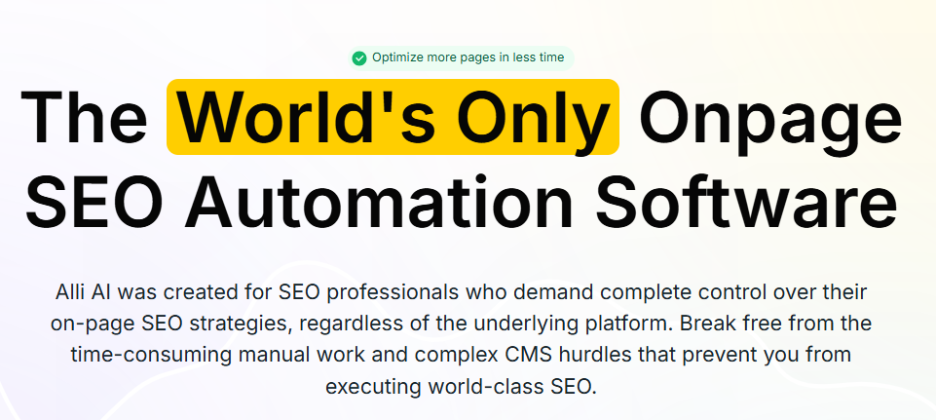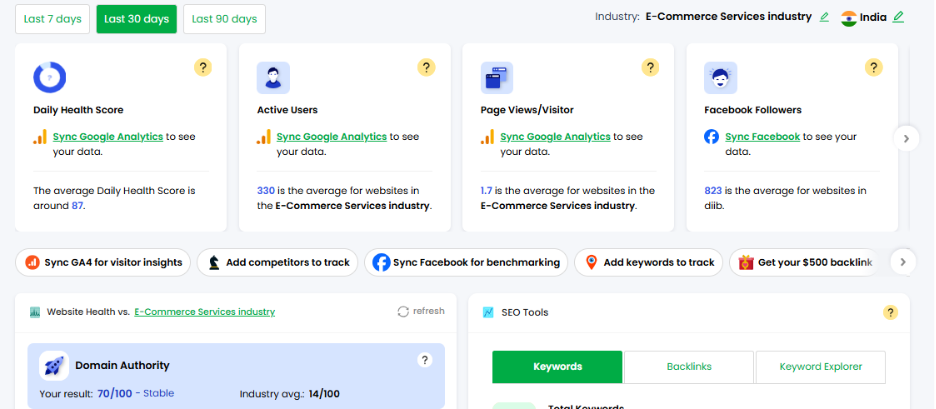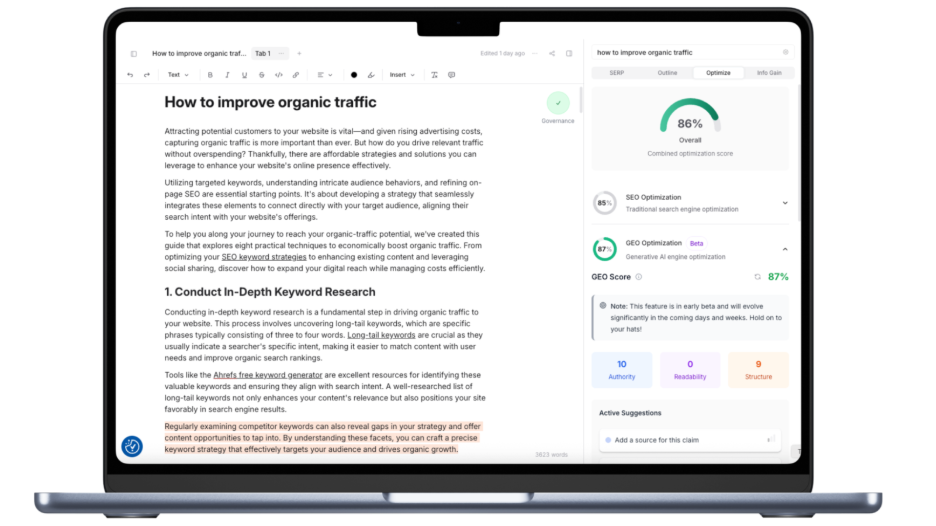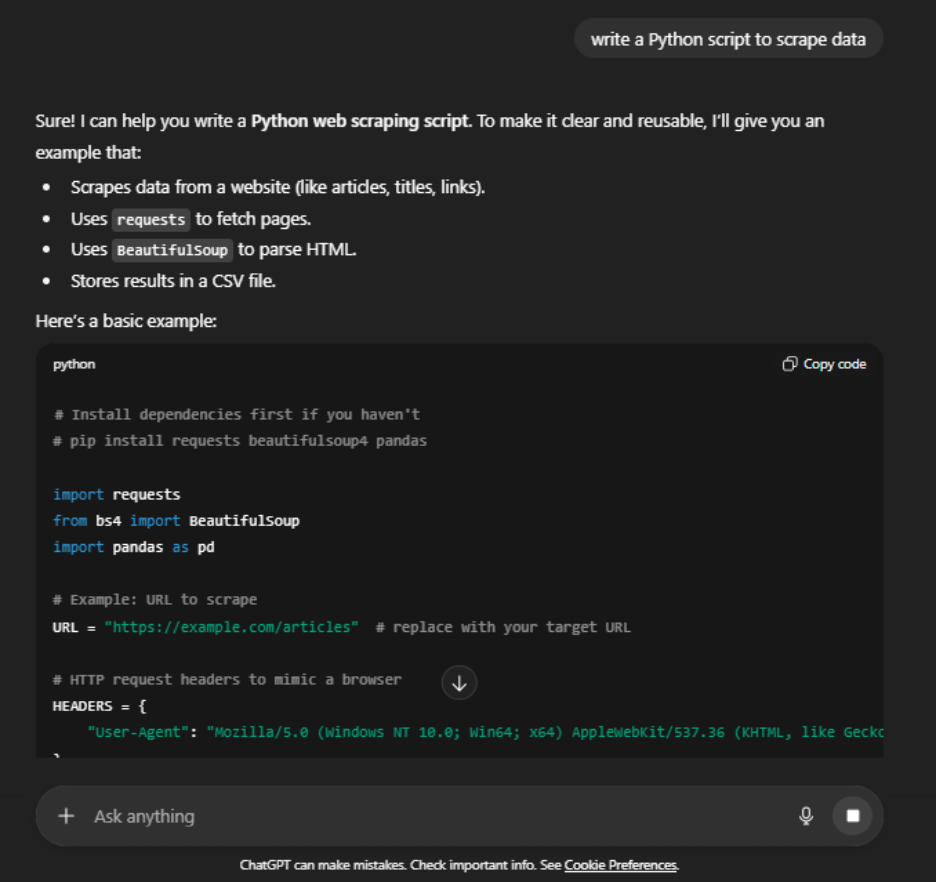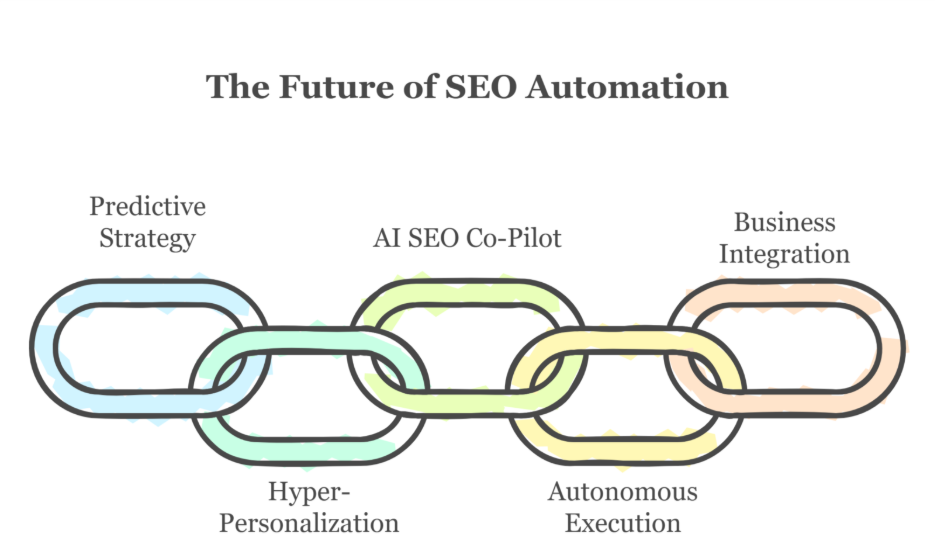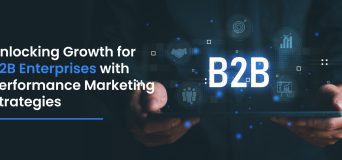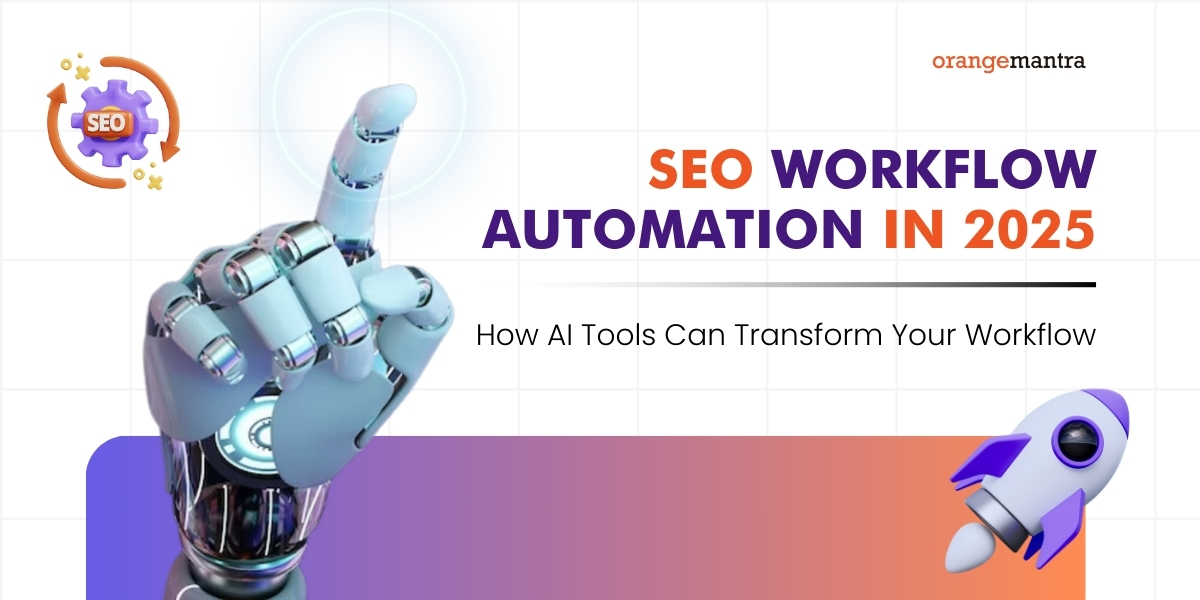
This guide walks you through using AI-driven automation to simplify your SEO workflow. We cover the key areas from keyword research and content creation to technical audits and link building - showing you the specific tools and strategies that make the process faster and more accurate.
Here’s what you will learn:
Is your competitors’ online presence growing faster than yours, despite your investment in SEO? This was our reality as well – until we embraced SEO automation last year.
In the present-day scenario, if you want to win at SEO, you require a strategic advantage. And that advantage is the use of AI in SEO.
I know that for decision makers like you, SEO is a core component of revenue growth. And that’s why I am writing this blog so that you can reallocate your biggest asset (skilled human talent) from repetitive data tasks to high-impact strategy that directly impacts your bottom line.
Read this guide to the end as it reveals how to leverage automated SEO services to reduce operational costs and build a sustainable competitive edge.
Table of Contents
AI in SEO Stats
- Around 354 million users google something per hour as per Statista.
- Google’s 90% market dominance in search is being challenged by the rapid rise of AI alternatives. A key example is ChatGPT, which amassed a million users in just five days.
- Nearly 3 in 10 US adults (28%) report that they do not have confidence in the reliability of AI-generated search answers.
- On August 21, 2025, Google launched AI Mode in 180 countries and territories.
- We’re now seeing a tangible impact on website traffic from AI search. The data shows organic visits have decreased by as much as a quarter (15-25%) since these features became prominent. The image below from bain.com provides more clarity on this.
Key Areas Where SEO Automation Can Work
I often see businesses using AI SEO services for tiny tasks, like fixing grammar. They’re missing the big picture. What if they could build a smarter, self-improving SEO system. Let me show you what that actually looks like.
1. Keyword Strategy
It used to take days to find the right keywords. Ok, at least hours! Now, AI analyzes the entire web to see what questions people are actually asking.
Your free version of ChatGPT can do that. It tells us not just what keywords to use, but what content to create to answer the next big question in your industry. However, there are chances that it can make those keywords sometimes.
2. Content Creation
AI can now develop comprehensive content briefs, create full-length, well-structured articles optimized for EEAT (Experience, Expertise, Authoritativeness, Trustworthiness). Not only that.
AI in content creation possess more than that and can adapt a single piece of content into different formats (blog post, video script, social media snippets) automatically
I don’t use AI to write finished articles. But I want to admit that I use it as a super-powered assistant. It can instantly research a topic, create a perfect outline, and draft a solid first version.
This frees up my best writers to focus on adding unique expertise, stories, and insights that AI can’t replicate. We produce higher-quality content, ten times faster.
3. On-Page SEO
Before, we’d optimize a page once. Now, AI tools constantly monitor how our pages perform in search results. They automatically test different titles and descriptions to see which one gets more clicks.
The system learns and improves on its own, squeezing more and more traffic from every page we have. Again, I want to add that some points suggested by ChatGPT may be inaccurate or speculative because it cannot fully browse or crawl the live page.
4. Technical SEO
With AI in SEO, you don’t have to wait for a report to tell the site is broken. AI acts like a 24/7 security guard. It watches my site’s health in real-time. And this is not theoretical.
At OrangeMantra, we have built a custom AI agent that monitors our site and triggers the next process if the site goes down.
Image showing high-level architecture of our custom AI Agent for website monitoring.
5. Link Building
The use of AI in SEO eliminates the guesswork. As it doesn’t just find websites but also analyzes them to find the perfect potential partners for my clients.
SEO automation with the help of AI can even help personalize an outreach email by understanding what that website owner cares about. We build fewer links, but they are high-quality links that actually matter.
6. User Experience
We can now use AI to understand how different types of visitors use a website. It can help us show slightly different content to a first-time visitor versus a returning expert.
This makes the website feel smarter and more helpful, which keeps people engaged longer – a signal Google rewards.
Why You Should Consider Automating SEO?
Understanding the ‘how’ is one thing. But the real question is, what does this SEO automation actually deliver for your business? It boils down to three critical outcomes.
1. It Saves You Money
We have seen this over years that a good amount of your best employee’s time goes into very low-level data work. With SEO automation, you stop paying high salaries for experts to do work below their level.
Automating reporting, audits, and monitoring reallocates your people to strategy and creativity, which is where they generate real revenue. This is a massive efficiency gain.
2. It Makes You Faster and More Accurate
In SEO, speed is a competitive advantage. Tell me, do you want your experts to copy paste things or find ways to win ranking in search engines and generative search engines? Definitely the second one.
AI automation spots ranking drops or new opportunities instantly, not in a monthly report. It also eliminates human error in data analysis. This means you react faster than your competitors and make decisions based on perfect data.
3. It Makes Your SEO Scalable and Predictable
It is true that manual processes hit a ceiling. You can only do so much. SEO automation allows you to manage 100 pages or 10,000 pages with the same core efficiency.
This turns SEO from an unpredictable cost center into a reliable, scalable growth engine for your business.
The 5 AI Tools That Actually Automate Your SEO Workflow
Let me be very clear that true SEO automation isn’t about using AI to write a few paragraphs but using tools that run tasks on autopilot. The following tools were chosen because they actively reduce or eliminate manual work. These are the engines of a modern, efficient SEO operation.
1. Alli AI
This is pure automation. Instead of your team manually optimizing hundreds of product pages or blog posts, you set rules and Alli AI implements them at scale.
Image taken from alliai.com
This SEO automation tool can automatically add internal links, optimize title tags, and fix missing alt text across your entire site without manual intervention. The provider also has other AI in SEO products like AI search visibility engine.
2. Diib
This tool automates the most tedious part of SEO: watching the data. It connects to your analytics and constantly monitors for critical issues like a sudden traffic drop or a ranking penalty and sends you a plain-English alert.
This SEO automation tool is like a 24/7 watchdog that eliminates the need for constant manual checking.
3. SEMrush
While it’s a full suite, its automation power lies in scheduled PDF reports and automated data pulls. You can set it up once to automatically send performance reports to your team or clients every week.
Image taken from AI SEO toolkit by SEMrush
This eliminates the “monthly reporting scramble.” The AI of this SEO tool also automates the initial phase of keyword research and trend discovery.
4. Frase.io / Surfer SEO
These SEO automation tools can analyze what a human would spend hours on. Instead of manually studying the top 10 search results to understand what makes them rank, these tools instantly generate a data-driven content blueprint. This automates the strategic planning phase of content creation.
Image taken from frase.io
5. Advanced ChatGPT prompts
How can we forget the most advanced form of automation. You can use AI to write the scripts that do the automating.
For example, you can have it write a Python script to scrape data, a formula to automate a complex spreadsheet, or code for a custom dashboard. It automates the creation of your own automation tools.
The Strategic Blueprint to Integrate AI into Your SEO Workflow
I personally don’t think that integrating AI is just like adding a few new software licenses. For SEO automation, we have to think of this as a complete redesign of workflow for maximum efficiency. The goal of any digital marketing company should be to create a system where AI handles the heavy lifting of data and execution. Here’s how to make that possible
1. Audit and Identify
Forget a complete overhaul overnight. Start by asking one question: “Where does my team spend the most time on repetitive analysis or manual reporting?”
Example: If your specialist spends 10 hours a month building client reports, that’s your target. The solution isn’t to work faster but to automate the reporting with a tool that generates dashboards automatically.
Action: Pick one or two of these high-friction areas to automate first. This creates a quick win and builds momentum.
2. Select Tools That Act as Force Multipliers
Don’t just buy popular software. Choose tools that seamlessly integrate and actively reduce manual work. Another good option is to find the right AI development company and build an AI agent that is customized to your needs.
Bad Approach: “We need an AI tool.”
Strategic Approach: “We need to automate our technical site audits. Therefore, we need a tool that continuously crawls our site and alerts us to critical issues without manual intervention.”
Action: Match the tool directly to the specific bottleneck you identified in Step 1.
3. Shift Your Team’s Role from Doers to Strategists
This is the most critical step. The value of your team is no longer in compiling data, but in interpreting it and making strategic decisions.
Before AI: Specialist spends days gathering ranking data.
After AI: The tool provides a live dashboard. The specialist now analyzes why certain keywords dropped and develops a content plan to recover them.
Action: Frame AI adoption as an upgrade to your team’s roles, empowering them to do higher-value work.
4. Create a Feedback Loop
Automation for its own sake is pointless. You must track the ROI.
Measure Time Saved: How many hours per month were freed up?
Measure Performance Impact: Did the faster implementation of optimizations lead to improved rankings or traffic?
Action: Schedule a brief monthly review to ask: “Is this automation making us more effective? Should we adjust or expand it?”
The Future of SEO Automation
I don’t know how many of you will agree. What I see as the future of SEO automation is not the tools that just give you reports but building a self-optimizing system. Yes, I am talking about Agentic AI.
We’re moving from helping humans do tasks, to creating systems that complete entire workflows with minimal intervention. Right now, we use AI to analyze current data. Soon, AI will forecast trends.
Agentic AI solutions will tell you, “Based on emerging user intent and competitor content gaps, Topic X will be highly valuable in 3 months. Start creating content now.”
Plus, search engines will increasingly reward websites that deliver unique value to each visitor. Here, agentic AI solutions will enable dynamic content personalization.
We’ll have an AI co-pilot that we converse with naturally. You’ll say, “Analyze our top 10 competitors and give me a content plan to outperform them on the topic of ‘sustainable energy,‘” and the system will return a complete, data-backed strategy.
Last but not least, SEO data will be one stream feeding a central business intelligence AI. This AI will correlate SEO performance with sales data, PR campaigns, and market shifts, providing a holistic view of how organic search directly impacts revenue.
You’ll ask, “Did our latest product launch impact organic traffic for related support articles?” and get an instant, cross-channel analysis.
Conclusion
The era of manual and time-consuming SEO is over. In 2026, AI-powered automation is the force multiplier that transforms SEO from a cost center into a scalable growth engine.
The businesses that will win are those that empower their experts to focus on strategy and creativity. By integrating the right AI tools and partnering with the right Agentic AI company for the customized AI agents; you can build a system that protects your revenue, reacts with market speed, and drives consistent growth.
The transition to an automated workflow is the most important strategic SEO decision you can make this year. The competitive gap between those who automate and those who don’t will only widen.
FAQs
Q1. Will SEO automation tools eventually make human SEO specialists obsolete?
No, not at all. Automation handles repetitive tasks like reporting, auditing, and initial research. This doesn’t replace a digital marketing specialist. The future specialist will be less of a technician and more of a strategist. Their value will shift to interpreting complex data, making creative decisions, understanding user psychology, and managing the AI tools themselves.
Q2. Is it safe to rely on AI for content creation without hurting our search rankings?
It’s safe only if you use AI as an assistant. Google states that its focus is on rewarding helpful, original content that demonstrates “Experience, Expertise, Authoritativeness, and Trustworthiness” (EEAT). AI-generated content that is generic, unedited, and lacks a human touch often gets flagged as low-value.
Q3. What’s the biggest mistake businesses make when starting with SEO automation?
The biggest mistake is automating a broken process. If your underlying SEO strategy is weak, automation will just help you make the same mistakes faster and at a larger scale. Another common error is trying to automate everything at once, which leads to overwhelm and wasted investment.
Q4. How much time and money should we expect to save with SEO automation?
This varies greatly, but you should view it as an investment in efficiency and quality, not just cost-cutting. Initially, there’s an investment in time to learn and set up the tools. The real savings come over the long term. You can expect to save dozens of hours per month on tasks like data collection and reporting. The greater benefit, however, is the value of the time reclaimed: your team can use those saved hours for high-impact work that actually drives growth, like strategic planning and creative campaigns, which leads to better results.
Q5. Can small businesses with limited budgets benefit from SEO automation, or is it only for large enterprises?
In many ways, small businesses benefit more because they need to maximize the impact of every hour and dollar. You don’t need the entire suite of enterprise tools. Start with one or two affordable tools that solve your biggest pain point. The core principle of working smarter, not harder, is even more critical for businesses with limited resources.
